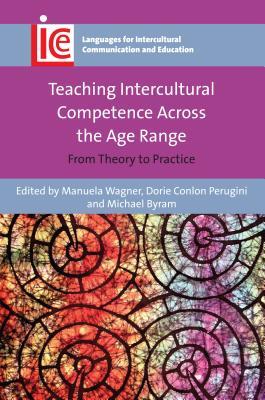Read Teaching Intercultural Competence Across the Age Range: From Theory to Practice - Manuela Wagner file in PDF
Related searches:
Get the Developing Intercultural Competence
Teaching Intercultural Competence Across the Age Range: From Theory to Practice
Teaching Intercultural Competence in the Classroom
Building intercultural competence in the language classroom
Towards the Development of Intercultural Competence Skills - ERIC
Intercultural Competence in the Work of Teachers: Confronting
Teaching Intercultural Competence Across the Age - Amazon.com
The Importance of World Languages and Intercultural Competence
Including the different: Intercultural competence in learning contexts
Developing and assessing intercultural communicative - the ECML
Intercultural Competence in the Work of Teachers Taylor & Francis
Teachers' Opinions on the Use of Personal Learning - MDPI
Teaching in the Intercultural Classroom: Components of
Intercultural Competence and the Role of Technology in
D eveloping the intercultural competence of young people, both in the domestic context as well as in the international sphere, requires a core of teachers and teacher educators who hav e not only.
Teachers (pre-school, primary, secondary, vocational, adult, special needs); teacher trainers; careers officers, educational guides and counsellors; inspectors;.
Teaching intercultural competence is crucial for students to become impactful citizens. To participate effectively in today’s globalized, knowledge-based economy, the united states needs innovative, creative, and entrepreneurial citizens.
What is intercultural competence, and why is it important? lntercultural competence is the ability to function effectively across cultures, to think and act appropriately, and to communicate and work with people from different cultural backgrounds – at home or abroad.
20 apr 2020 this book critiques models of intercultural competence, whilst suggesting examples of specific alternative approaches that will successfully.
6 mar 2015 a teacher's thoughts on the value of studying other cultures and world high levels of communicative proficiency and intercultural competence.
9 oct 2019 icc requires a critical examination of thoughts through reflective actions, problem -solving skills, an ability to recognize and deconstruct.
Intercultural competence is the ability to communicate effectively in cross-cultural situations and to relate appropriately in a variety of cultural contexts.
“intercultural competence is part of a family of concepts including global competence, graduate attributes, employability skills, global citizenship, education for sustainable development and global employability” (monash this is a preview of subscription content, log in to check access.
Increasing teachers' intercultural competences in teacher preparation programs and through professional development: a review.
In this resource, instructors can learn about the concept of 'intercultural competence' and explore strategies for teaching both with and for intercultural.
Develop an awareness of one's own cultural and disciplinary identities and positionality in the classroom.
14 sep 2017 in this study, ic is understood as the ability to change cultural perspective and adapt our behaviour to deal with cultural differences.
Developing and assessing intercultural communicative competence.
Chapter 1: going forward with intercultural competence (ic) in teacher education and training: beyond the 'walls built by ghosts'? fred dervin, robyn moloney.
Byram (2000) asserts that intercultural competence is an essential skill for language teaching professionals.
Intercultural communication competence (icc) is the ability to communicate effectively and appropriately in various cultural contexts. Some key components include motivation, self- and other knowledge, and tolerance for uncertainty.
The current study aims to investigate how kazakhstani efl (english as a foreign language) teachers from english-medium schools perceive icc and to what.
Intercultural awareness, foreign languages, competence in working across borders, and respect for other cultures? really? tell me more there is broad agreement that the first two sets of goals above will be crucial for the decades ahead. But many still aren’t convinced about the importance of intercultural competence for 21st century learners.
Intercultural competence refers to the ability of a person to naturally employ a wide range of cognitive, affective, and behavioural skills that will assist in facilitating communication with people from different cultural origins.
In this study it was hypothesized that collaborative learning in international higher education contributes to the development of intercultural competence.
Hammer (2012) defined intercultural competence as the capability to accurately understand and adapt behavior to cultural difference and commonality� over.
Intercultural communicative competence is an attempt to raise students' awareness of their own culture, and in so doing, help them to interpret and understand other cultures. It is not just a body of knowledge, but a set of practices requiring knowledge, skills and attitudes.
4 may 2017 enhancing teachers' intercultural competence teachers are viewed as dynamic agents of change in educating the global learner and building.
18 aug 2019 teachers grouped into six separate codes: intercultural learning communities, the development of students' intercultural competences.
Module 1: intercultural competence -self reflection - the aim of this module is to: present a basic pedagogical model on how to understand intercultural competence; reflect on the importance of self-awareness and curiosity as a way towards intercultural awareness; introduce and discuss the concepts ethnocentrism, stereotypes and culture.
2 jan 2020 cultural competence has been identified as one of three factors central to culturally relevant teaching and pedagogy, ladson-billings, 2004,.
This course supports teachers in developing the skills, knowledge and attitudes to effectively adapt your teaching to the specific needs of a diverse classroom.
Intercultural learning is a life-long learning process, intercultural competence can never be fully achieved. Assessment should be qualitative and formative, voluntary, participatory, tailored and learner centered. Addressing certain aspects of intercultural learning intercultural learning implicitly refers to interaction between people.

Post Your Comments: